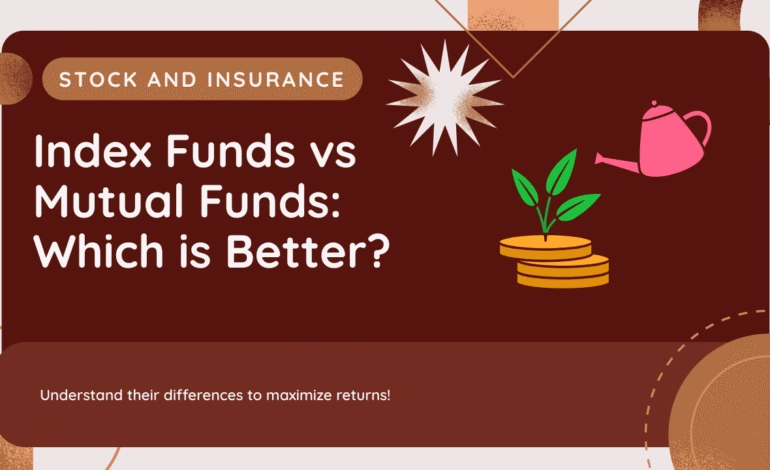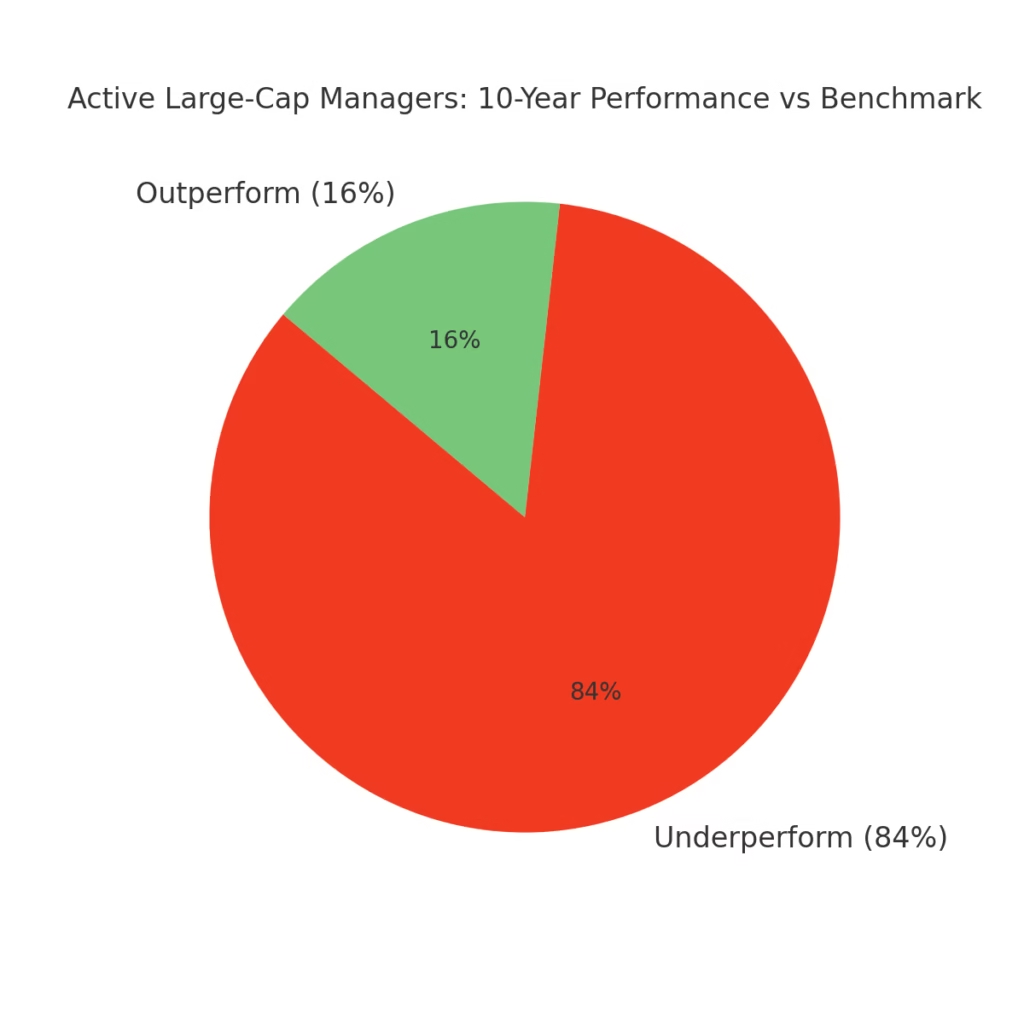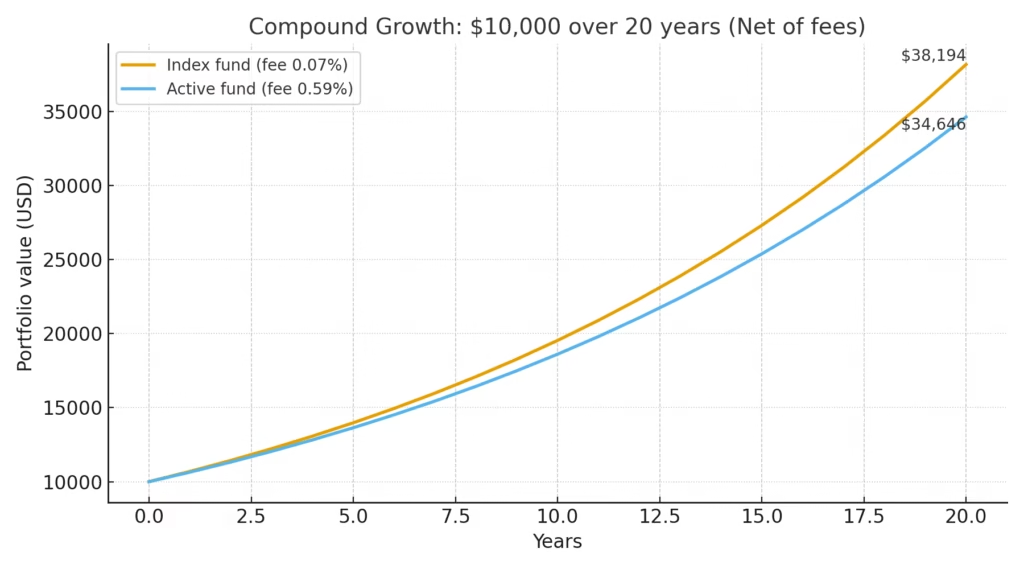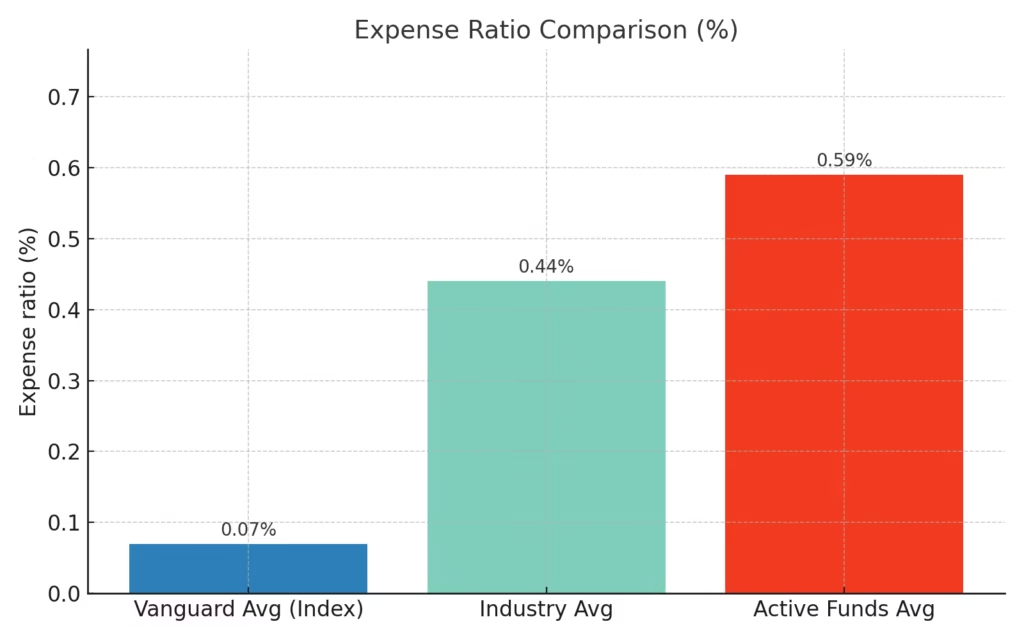
The Big Investment Dilemma
If you have ever searched “index funds or mutual funds which is better,” you are not alone. Every new investor at some point asks this exact question. Both options are popular, both can build wealth, and both are available worldwide. But the difference between index funds and mutual funds is not always clear, and making the wrong choice can cost you returns or even peace of mind.
So, let’s break it down step by step in a way that anyone can understand. By the end of this guide, you will not only know the difference between index funds and mutual funds but also understand which one suits your style of investing.
Before we dive deeper, here’s a quick quiz for you.
Question for you: If you had $1,000 today, would you rather hand it over to a fund manager to actively grow it, or let it quietly follow the stock market index with minimal costs? Think about your answer, and let’s see if it matches the analysis below. Share in the comments if you want to compare with others.
What Are Mutual Funds?
Mutual funds are like investment baskets managed by professionals. Imagine you and 99 other people pool your money together, and a skilled fund manager invests that money into different stocks, bonds, or assets. The idea is to diversify risk and give you access to professional expertise.
- Example: Let’s say you invest in a Mutual Fund focusing on US technology stocks. The manager might include Apple, Microsoft, Amazon, and a few rising startups. If Apple does well, your fund value rises. If the manager picks the wrong stocks, your returns fall.
- Have you ever paid a chef at a restaurant to choose the best meal for you? That’s similar to how a mutual fund works. You trust the manager’s choice.
Pros of Mutual Funds
- Active management may outperform the market in certain years.
- Diversification across sectors and industries.
- Suitable for investors who want professionals making decisions.
Cons of Mutual Funds
- Higher expense ratios (fees charged by managers).
- Risk of underperformance compared to index funds.
- Not tax efficient in some countries like the US.
What Are Index Funds?
Index funds are like autopilot investing. Instead of a manager picking stocks, the fund simply mimics a stock market index. For example, the S&P 500 Index Fund tracks the top 500 companies in the US.
- Example: If Apple makes up 6 percent of the S&P 500, then 6 percent of your index fund is invested in Apple. No manager is trying to beat the market; the goal is to mirror it.
- Think of it like a mirror. Whatever the index does, your fund does. Do you prefer the simplicity of following the market instead of paying someone to guess it?
Pros of Index Funds
- Very low costs compared to mutual funds.
- Historically strong long-term performance (Warren Buffett recommends them).
- Highly transparent and easy to understand.
Cons of Index Funds
- No chance to beat the market (you get market returns).
- In short-term volatility, you still face the ups and downs.
- Limited flexibility compared to actively managed funds.
If you are new to Stock market” you may find it helpful to read our Beginner’s Guide to Stock Market before diving deeper.
The Core Difference Between Index Funds and Mutual Funds
At this point, let’s summarize the difference between index funds and mutual funds:
- Mutual funds: Actively managed, higher fees, potential to outperform.
- Index funds: Passively managed, low fees, consistent with the market.
Quiz: If your investment goal is long-term retirement savings, do you think low-cost index funds or mutual funds which is better? Comment below your reasoning and let’s discuss.
Performance, Risks, and Costs – Index Funds vs Mutual Funds
Historical Performance Comparison
When investors ask “index funds or mutual funds which is better,” performance is usually the first factor. History shows that most actively managed mutual funds fail to consistently beat the market over long periods.
For example, the SPIVA Report by S&P Dow Jones Indices shows that in the US, more than 85 percent of active fund managers underperformed their benchmark index over a 10-year period. This means that if you had invested in an S&P 500 Index Fund, you likely would have outperformed the majority of mutual funds, simply because you avoided high fees and poor stock picks.
But that does not mean mutual funds are useless. In specific niches (like small-cap stocks, emerging markets, or sector-focused funds), a skilled manager can add value. So, the choice often depends on whether you believe in market efficiency or in the skill of a fund manager.

Cost Comparison: Fees Matter More Than You Think
Costs can eat into your returns faster than you realize.
- Mutual Funds: Average annual expense ratios are between 0.50 percent to 1.5 percent. Some actively managed funds may charge even more. Over 20 years, this can drain thousands of dollars from your portfolio.
- Index Funds: Expense ratios are often as low as 0.05 percent to 0.20 percent. Vanguard and Fidelity even offer funds with zero expense ratios in the US.
Here’s a practical example: If you invested $10,000 for 20 years at a 7 percent annual return:
- With a 0.59 percent fee (Active fund), you’d end up with around $34,646.
- With a 0.07 percent fee (index fund), you’d end up with around $38,194.

That $3,700 difference came only from fees, not from better performance.
Question: If someone offered you two identical cars, but one came with a $3,700 higher price tag, would you still buy it? That is exactly how many investors unknowingly pay for mutual funds.
Want to see practical options? Check out our detailed guide on Low-Cost Mutual Funds for Developed Market Growth 2026 to explore funds that keep expenses at a minimum while offering solid global exposure.
Risk Analysis: Volatility, Manager Risk, and Market Cycles
Both index funds and mutual funds carry risks, but the type of risk differs.
- Index Funds: You are tied to market risk. If the market crashes, your fund falls. But you don’t carry the extra risk of a manager making poor choices.
- Mutual Funds: You face both market risk and manager risk. If your fund manager picks the wrong stocks, your returns may fall even when the market is performing well.
Take 2020’s pandemic market crash as an example. While most mutual funds struggled, index funds that tracked the S&P 500 bounced back faster simply by following the market. Some mutual fund managers panicked and missed the rebound.
Imagine you are in a bus. An index fund is like staying on the main highway no matter what happens. A mutual fund is like taking shortcuts with a driver who may or may not know the way. Which feels safer to you? Share in the comments.
Think of choosing between index funds and mutual funds like picking the right insurance plan. Just as you’d compare protection in our blog on Best Car Insurance Policies for Young Drivers in Tier 1 Countries, investors should weigh risk coverage before deciding.
For deeper insights, check the Morningstar Risk Ratings, which provide a reliable benchmark to compare how different funds handle volatility.
Tax Efficiency: An Overlooked Difference
Taxes often decide how much money you actually keep.
- Mutual Funds: Because managers frequently buy and sell securities, they create taxable events. In countries like the US, investors may pay capital gains taxes even if they did not sell their shares.
- Index Funds: With lower turnover (fewer trades), index funds are more tax efficient. You usually pay taxes only when you sell your shares.
Example: Suppose your mutual fund sold some Apple shares this year and generated a gain. You might get a tax bill even though you did not sell your fund shares. With an index fund, you avoid this until you personally sell.
If you’re also focused on long-term tax planning, our article on “Wealth Building Strategies in Your 30s” offers practical steps to maximize savings and investments. For US-based investors, you can review the IRS official guide on mutual fund taxation to better understand how distributions and gains are treated.
Case Studies, Decision Framework, and Final Verdict
Real-Life Examples: How Investors Decide
Let’s bring the theory into practice.
Case Study 1: Emily, a 25-year-old professional in Canada
Emily has just started her career and wants to invest long-term for retirement. She is not interested in constantly tracking the market. For her, an S&P 500 Index Fund or a global index ETF is a perfect fit. She benefits from low fees, broad diversification, and doesn’t need to worry about manager performance.
Case Study 2: James, a 40-year-old executive in the US
James has more disposable income and wants exposure to niche markets like biotechnology and emerging markets. He chooses a combination of index funds for his core portfolio and a few actively managed mutual funds for specialized exposure. This hybrid strategy lets him capture growth opportunities while keeping costs under control.
Case Study 3: Priya, a 35-year-old in Singapore
Priya has always believed in professional advice and likes the idea of an expert managing her money. She invests in mutual funds with strong track records, even though the fees are higher. For her, peace of mind is worth the cost.
For investors looking at practical fund options, explore our blog on “Low-Cost Mutual Funds for Developed Market Growth 2026”.
Decision Framework: Which One Should You Choose?
When asking “index funds or mutual funds which is better,” the truth is it depends on your financial goals, risk tolerance, and investment style. Use this simple framework:
- If you want low-cost, long-term wealth building – Go with Index Funds.
- If you believe in expert stock picking and are okay with higher fees – Consider Mutual Funds.
- If you want a balanced approach – Mix both.
Think of it like cooking at home versus dining out. Index funds are like cooking a simple but nutritious meal every day. Mutual funds are like going to a restaurant where a chef prepares something special. Both can satisfy your hunger, but one costs more and depends on the chef’s skill.

Quiz for you
Let’s make this fun. Imagine you are about to invest $10,000 today.
- Would you prefer steady market returns with low fees (Index Fund)?
- Or would you take a chance on a manager beating the market even with higher fees (Mutual Fund)?
Answer in the comments below. Which camp do you fall into – Team Index or Team Mutual?
Final Verdict: Index Funds vs Mutual Funds
So, is there a clear winner in the index funds vs mutual funds debate? The answer lies in your personal needs.
- For most beginners and long-term investors, index funds are the smarter choice. They are simple, low cost, and historically reliable.
- For seasoned investors with specific goals, mutual funds can add value. But only if you carefully choose funds with a proven track record.
The key takeaway is not to view it as a competition but as a toolkit. Both have their place, and a well-diversified portfolio may include a mix.
If you want to strengthen your analysis skills, check out our “Step-by-Step Guide to Reading a Company’s Balance Sheet” for practical tips.
If you enjoyed this breakdown of the difference between index funds and mutual funds, drop a comment below with your investing style. Share whether you lean towards the simplicity of index funds or the strategy of mutual funds. And don’t forget to explore our related guides on mutual funds for developed market growth and wealth-building strategies to level up your investing game.



